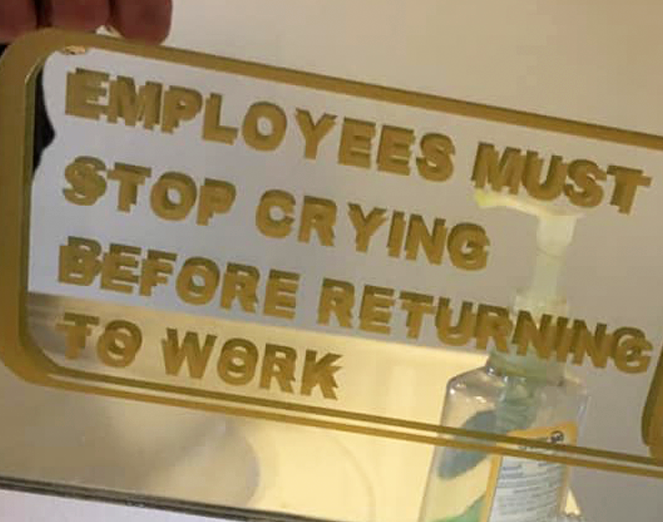

Sounds like hot business!


Sounds like hot business!


You probably develop it the same way that pretty much all medicine was developped before about a hundred years ago: trial, and error. For example: randomly stumble upon penecillin in experiments in 1928. Then take another decade, and other scientists to actually figure out the chemical composition and how it helps as a medicine.


Since they will not use Github for Pull Requests, bug tracking, or any other bonus feature on top of git, I have to disagree. It would be super easy to change the host of their git repo.


If you tell a profesional that the answer is “B”, while the professional had “A” in mind, you will have to convince them on why “B” is the correct answer, or they will ignore your suggestion. I think a good LLM model should be able to tell which features it valued most in it’s reasoning. It would make it much easier to get used to as a tool that way.


What you are mentioning is forcing companies to comply when selling inside the EU or California. The EU does not force companies to comply with their specifications outside of the EU. Companies simply do so because it is convenient.
The EU cannot decide how cars should be made that are sold in California. If they tried, I bet the US government would have something to say about it.
What the EU can do, is exert influence to get other governments to adopt the same rules. This already happens with a lot of countries surrounding the EU. But asking another government to adopt rules, is wildly different from forcing companies to adhere to those rules inside the borders of another government.


Not entirely. There still exists trade agreements, and diplomatic pushback.
Forcing companies to make products to a certain specification, would mean the EU is attempting to regulate other markets. Markets it has no direct governance over. While it may come from good intentions, it still invades the authonomy of the governments that should have governance over these markets.
Much better would be to work together with other countries, and help these countries implement similar rules, and enforce them together. Like, pretty much that the EU is doing for its members in the first place.


It is only logical that an algorithm trained on the ways of a Vulcan, is precise and accurate in it operation and communication. Vastly more fascinating are the result when you ask it to behave like a human.


The problem with C++ is not the lack of safety features. It’s the ever lasting backwards compatibility that is keeping it both alive and down at the same time.
Having to support 50 year old code, is going to limit any restriction you place. But it is usually the restrictions that make a language good.
Example: You can write perfectly good modern C++ code without any pointers. But pointers are so ingrained into the language, that it is impossible to remove them.


Google is not a mobile phone network provider. SMS routing is not really their cup of tea. It is an industry with lots of established players, lota of local issues, and little to gain for Google. If it where up to Google, everyone would be using their app instead of SMS.


In The Netherlands, the power grid has been turned into a different company than the power supply company. Same for gas and internet. The infrastructure companies are tightly regulated, to the point that they might as well be gpvernment branches. The providers however, are free to offer whatever.
The result is healthy competition where possible, without any company gaining a monopoly position over the utilities of individuals.
The drawback is that they figired out that the best way to make money, is of the backs of lazy people. People who don’t want to switch providers, cause that means effort. Hence, not actively looking for a better offer every few years is quite costly.
I love the fact that people joke about this nowadays. Because my mom still has bad memories from her childhood, where her teachers forced her to be right handed, acting as if it was a choice, and she was just really bad at writing. This was not a third world country either, but the Netherlands.
But I love coding at work?!
The problem is that every living entity in a 10 kilometer radius around me, seems to be hellbent on getting me to do anything but coding. Refining work estimates, fixing badge access rights, fixing a driver issue, telling people that you cannot do 1000 things at the same time, teaching the new developer how shit (doesn’t) works, mangling Jenkins into a functional state again, explaning that thing I did a year ago but is only now used (it was very high prio a year ago), writing documentation that noboby ever reads, progress meetings, specialty group meetings, knowledge sharing meetings, company wide meetings, etc.


I don’t understand why someone would want to rent their car. Maintenance is not that hard, and companies always make you pay way more for their subscription models. By owning the car, you can pick who does maintenance. Meaning there can be competition, so prices/quality remains good.


For some, this subscription model is great. But do you agree, that is it a bad thing if they force it on us?


You are asking them for their fish. This request seems to be an attempt to teach your politicians how to fish.
I’d much rather see them use it to lobby in favour of taxes on the wealthy, than seeing a handful of them give part of their money away.


These speeds have an actual use for the military. Since they are faster and fly higher than anything else in the sky, it is really hard to get a missile to intercept these birds. Hence, they can fly over interesting locations, take pictures, and scedattle.
Maybe even drop a payload. Which effectively turns them into reusable ICBMs.


Https is explicitly designed against man-in-the-middle attacks. Modern browsers make a bigggg fuss if a man-in-the-middle is attempting some shit. Those attacks do not work.
And if you do manage to make it work, it sure wouldn’t be easier than pointing a gun at someone and telling them to pay up for their internet connection.


That does not work without forcing the users to also use the proxy. Any website that uses https instead of http does not leak passwords, unless the device/browser of the user is compromised.
It sounds like a mechanism to make the town dependend on the cartel for internet, and then demand extortion prices for the internet.


Europa Universalis IV and Stellaris. For exactly the same reasons.
I spend way too much time in those games. Hundreds of hours each. But the end game is just too much of a slog. You already won, so there is no challenge; the framerate tanks into unplayable territory; and the micromanagement to manage the late game wars and economy becomes insane.
But starting with a different empire, and doing early/mid game again is awsome!
Our group played this system for a short bit. We loved the social combat system and the pooled resources. A good DM can absolutely make it feel like a Star Trek episode. Our problem with the system, is that you have to play the lawfull good guys for it to work well; just like a Star Trek episode. Our group likes to play morally grey.